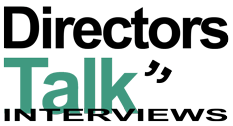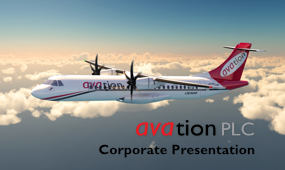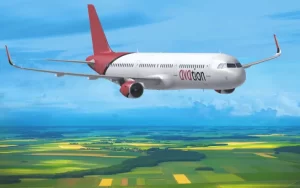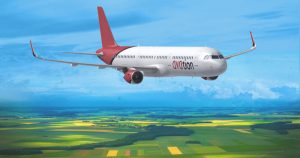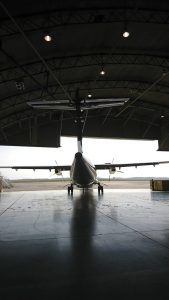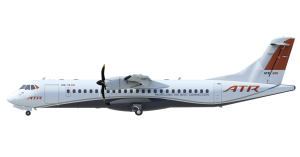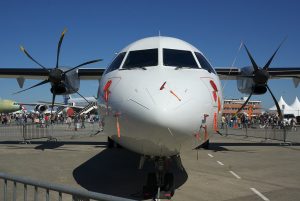Avation plc (LON:AVAP) Executive Chairman Jeff Chatfield caught up with DirectorsTalk for an exclusive interview to discuss aviation investments, ATR deliveries, airfares & aircraft purchase prices, SAF certification and the benefits of 75% of the company’s revenue coming from Asia.
Q1: Now, at the Paris investor day, you would have met with numerous aviation investors. Just in terms of feedback, what are their thoughts about aviation investments today and over the coming year?
A1: The market is extremely bullish and it’s attracting big amounts from investors who probably wouldn’t fit the profile of who you would imagine would be involved at this state of the interest rate cycle. There’s hedge funds and other investors that usually look for double digit returns appearing and investing in aircraft which is an interesting dynamic.
It’s driven prices up so the valuations of existing aircraft have gone up which is a bullish sign, we don’t know how long that’ll last but it’s certainly bullish at the moment.
Q2: Avation has 30 ATR orders and options over 4-5 years. Are deliveries expected to be spread evenly over each year or frontloaded or even end loaded?
A2: We’ve got an order book of ATR aircraft and ATR are the best CO2 aircraft in the world, low CO2, sustainable aviation fuel and very very popular for airlines that want to reduce their carbon footprint.
They’re pretty much sold out already so as production has really commenced, they’ve got to ramp up production so you would expect those to be spread out. ATR can’t make enough at the moment and their production is somewhat constrained due to supply chain issues, all the manufacturers are having problems with building aircraft which is probably why second-hand aircraft have increased in value.
Q3: Just in terms of market recovery, with strong demand and constrained supply, is it easing at all? Are you expecting airfares to rise further and aircraft purchase prices to escalate?
A3: I think aircraft purchase prices for existing aircraft that are flyers will escalate, there’s no doubt about that, clearly, there’s demand for aircraft and travel.
Airfares, we are not really directly exposed to air fares, airlines are, we lease aircraft to airlines so we’re on the back foot there. It would be hard to imagine airfares getting any higher because they’re already at an extremely high level at the moment to the point where I think passengers are starting to get worried about it.
I think that’s just demand, I don’t think there’s enough aircraft flying to satisfy the demand, the load factors of commercial aircraft around the world are very high and consequently, that allows airlines to charge more. The reason load factors are so high is there’s not enough aircraft but there’s demand.
Q4: Looking at aircraft technology as a whole, we’re seeing OEM’s aiming for SAF certification and a slow intake in SAF usage, are you seeing similar excitement for other technologies such as hydrogen?
A4: No, the SAF thing, it takes years to change aircraft technologies, it’s not an immediate thing, you can’t just say ‘wow, I’ve got a great idea to build an electric aircraft next year’, that takes 5/10/15 years to make a change like that.
SAF is a small incremental change, Sustainable Aviation Fuel is a manufactured jet fuel, it’s substantially similar to natural jet fuel so it’s a certification process to allow engines to use that fuel, it just takes time to have it certified and some requirements for lubricants to be added and all of the rest of the stuff. It’s not a huge leap, the problem with sustainable aviation fuel is it’s very expensive, at the moment it’s three times the price of normal fuel, and it’s produced in tiny quantities so when you say airlines are not taking it up, well it’s not really available.
I think they will take it up when it’s available, the manufacturers of engines will allow the use of sustainable aviation fuel but for a broader technological change, it will take a long time, it’ll take 15 years or so in my view. Aviation is so regulated and safety is so important, no one will take the risk o allowing unproven technologies to be deployed with the public, in a near term.
Q5: Where do you see the most excitement in technological developments?
A5: The most excitement is I think in modern engine types so the engine types are getting more efficient in terms of CO2, being certified for sustainable aviation fuel and on a per seat basis, they’re improving.
So, the increment improvements in engine technology is pretty good at the moment.
Q6: Avation has some A220’s in the fleet, would you be keen to add more 220’s if opportunities appeared?
A6: Yes, definitely. The A220’s are probably the best investment in the world because they’re a new clean design so they’re low CO2, 20% less CO2 per passenger, low fuel burn, extremely good aircraft, really good investment.
They’ve been going super well, the problem is supply, there’s not enough of them, Airbus’ ability to sell them outstrips their ability to make them, so they’re so supply constrained.
Q7: What would be your favourite current production narrow body from the air show if we had one to sell today?
A7: The best two investments, in our view, are A321’s, the A3221neo is pretty good, and A220’s.
Q8: Now, Asia was slow to come out of COVID, Boeing and Airbus have forecast growth in Asia to lead the globe over the coming years. With 75% of Avation’s revenue coming from Asia, have you consciously focussed the company on Asia for those reasons?
A8: Obviously, we’re Asia-Pacific and Europe so we’re not purely Asian.
The Asian markets are huge, the advantages of the Asian markets is you’ve got a lot of people within a short flying distance so they need a lot of aircraft. For example, the United States market, they’ve got access to their own money, they don’t need resources as much as Asin does so it’s a right market for leasing aircraft in Asia with lots and lots of growth.
You’ll see from the air show, the really big orders were Asian, they wouldn’t order aircraft if they didn’t have a demand for them.
